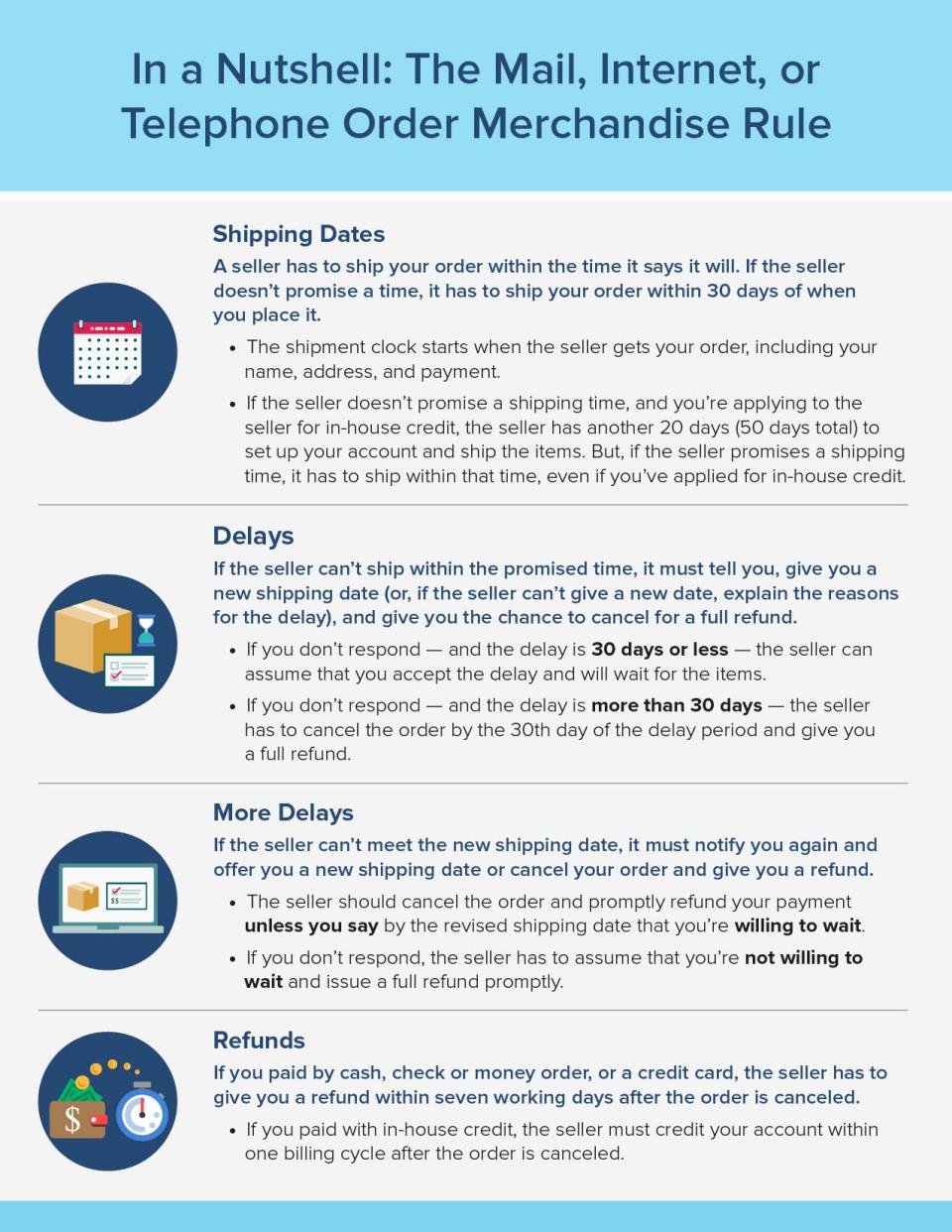
Did you order something that didn't arrive? A company can't make you wait forever. If something didn't arrive or you didn't accept it, and the company won't refund your money, dispute the charges. And, if products show up that you never ordered? You don’t have to pay for them. Federal laws protect you.
The federal Mail, Internet, or Telephone Order Merchandise Rule applies to most things you order by mail, online, or by phone. It says:
The chart below details how the Rule works. But first things first: Contact the seller. Most businesses will work with you to resolve the problem and keep you as a customer.

What if you never got your order, or rejected it, but your credit or debit card statement shows you were charged? If the company won't reverse the charge, dispute it. But know that different consumer protections apply to credit and debit card charges.
The Fair Credit Billing Act treats certain credit card charges that you dispute as billing errors. Billing errors include charges for items that you didn't accept or that weren't delivered as agreed, involved the wrong amount, were unauthorized, and certain others. Disputes about the quality of the item are not billing errors. The law spells out how to challenge billing errors.
By law, credit card billing errors must be disputed in writing within 60 days of the date that the first statement with the billing error is sent to you. Otherwise, you may get stuck with the bill.
Send a dispute letter to your credit card issuer at the address listed for billing disputes, errors, or inquiries — not the address for sending your payments. Look on your statement, online, or your credit card agreement to get the right address. Use this sample letter for disputing credit and debit card charges.
One thing to know: Some issuers let you dispute billing errors over the phone or online. However, to be sure that you get the full protection of the law, follow up with a letter.
The credit card issuer must acknowledge your dispute in writing within 30 days of getting it, unless the problem has been resolved. The issuer must resolve the dispute within two billing cycles (but not more than 90 days) after getting your letter.
You don't need to pay the disputed amount and related finance or other charges during the investigation. But you have to pay any part of the bill that’s not in question. Learn more about disputing credit card charges.
What if you agreed to delivery on a date in the future that turns out to be more than 60 days after your statement showing the charge was sent to you — but the delivery didn’t arrive or you rejected it because it was not what you agreed to buy? Can you still dispute the charge?
You’re likely outside the protection of the Fair Credit Billing Act. Still, some credit card issuers may extend the 60-day dispute period when a shipment is delayed. Send a dispute letter to your credit card company. Include copies of any documents showing the expected and actual delivery dates, including any notice the seller sent you about the shipment delay.
The consumer protections for debit cards are different from the protections for credit cards. You may not be able to get a refund for non-delivery or delivery of the wrong item. Contact your debit card issuer — often your bank — as soon as you know there’s a problem. Some debit card issuers may voluntarily offer protections. Start by calling the customer service number. Follow up with a letter. This sample letter for disputing credit and debit card charges can help.
By law, companies can’t send unordered merchandise to you, then demand payment. That means you never have to pay for things you get but didn’t order. You also don’t need to return unordered merchandise. You’re legally entitled to keep it as a free gift.
Sellers can send you merchandise that is clearly marked as a gift, free sample, or the like. And, charitable organizations can send you merchandise and ask for a contribution. It's your right to keep such merchandise as a free gift.
Sometimes, you might sign up for a free trial, only to discover that the company starts sending you products every month, and billing you. That might be a scam. Learn about free-trials, auto-renewals, and negative option subscriptions and what to do if you're charged for products you don't want or didn't order.
To help avoid shopping hassles:
Remember, if you have problems with a purchase that involves billing errors for credit cards or disputes for debit cards, contact your credit or debit card issuer right away. You may also want to contact the seller, but don’t lose time with a slow process that could push you outside your legal protections for working with your credit or debit card issuer.
If you experienced or suspect a scam, report it to the FTC at ReportFraud.ftc.gov. Your report can help law enforcement build cases against scammers, spot trends, and alert others in your community to the scam.